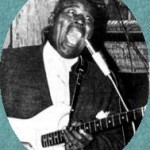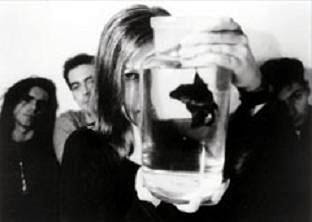
Howlin’ Wolf was a massive chap with, as his name suggests, a blues howl to send shivers up your neck. His key work, recorded for the Chess label in the 1950s, is up there with the greats of electric blues, like Muddy Waters and Willie Dixon.

Live And Cookin’ was originally released by Chess in 1972, and is long out of print. Australian label Ravel have given it a bit of sonic recalibration, and added two further tracks that couldn’t fit on the original album.
New fans should investigate the seminal sides first, as this album shows “the Wolf” in terminal decline. Despite having suffered a series of heart attacks, and having to have regular dialysis treatments, the ailing Chester Burnett gives his all in this performance, and his vocal power is hardly diminished.
What makes this one for the hardcore fans only is the sloppiness of the band. I’m sure some blues afficionados will crucify me for that statement, claiming that the looseness is what makes them great, but a lot of the time, it sounds like the band hardly know what song they’re playing, and in the case of the saxophonist, he’s out of tune just about as much as he’s in it. What helped to make those original cuts so great was the rigid grooves that the band kept to throughout; in contrast, the band on this gig sounds like a loose aggregation gathered half-drunk from some down-at-heel barroom.
The sad thing about Live And Cookin’ is that the audience at Alice’s Restaurant sounds both small and disinterested. Chatter and the clinking of glasses can be heard spasmodically throughout the album, while the ailing legend gives his utmost.
I’ve had the vinyl of this album since it was first issued, and ‘Call Me The Wolf’ has always been my favourite. It’s a very repetitive slow blues, in which over and over again “the Wolf” howls for all he’s worth with his famously powerful and gruff voice. It’s awe-inspiring, especially given the circumstances – I mean, was it really wise singing like that which his health problems?
The bonus tracks are actually two of the best on the disc, although ‘Mr Airplane Man’ bears more than a passing resemblance to ‘Call Me The Wolf’ – the very same howling groove, in fact. But let’s not hold that against the man, who brought a whole new flavour to the blues, and was never really honoured for his rockin’ gritty brilliance.
Just four years after this album “the Wolf” was finally felled for good, without the recognition he really deserved. In 2011, a little goes a long way when it comes to the Howlin’ Wolf. It can all sound a bit repetitive playing his songs back to back. That’s not his fault – back in the ‘50s the longplaying album wasn’t the dominant recorded playback form, so listeners weren’t faced with track after track of relentless blues with similar rhythms and themes. Listen to Howlin’ Wolf one track at a time and his brilliance will curl your toes. GARY STEEL
SOUND = 3/5
MUSIC = 3.5/5

Howlin’ Wolf – Live And Cookin’ At Alice’s Revisited (Raven/EMI) CD REVIEW
Latest from Music

From The Archives: Sly Dunbar talks
That time GARY STEEL chatted with drummer Sly Dunbar of the famed Jamaican rhythm section, Sly & Robbie. First, the story. After, the unexpurgated

World’s Worst Records: Cattle Decapitation’s To Serve Man
MATT KELLY actually likes Cattle Decapitation but this early blunder is especially bad in a multitude of ways and is endlessly deserving of derision.

Let there be drums!
Six diverse percussion compositions performed by virtuosic musician Justin DeHart challenge common notions about the most primal of instruments.

World’s Worst Records: Alison Gold’s Shush Up
Gold's follow-up to 'Chinese Food' was so regrettable and tasteless that she had to change her name, writes our dean of tack, MATT KELLY.

Heilung – A cyberpunk reimagining of ancient culture
Hardened atheist GARY STEEL attends bizarre show by German/Nordic group Heilung and has “spiritual” experience.









